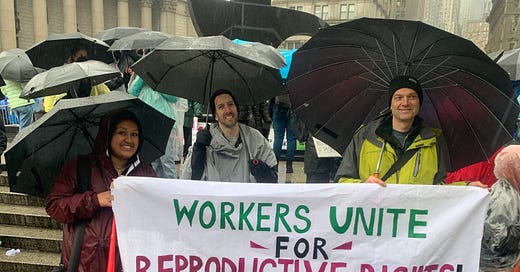Feminists push for organized labor to fight for reproductive justice
AFL-CIO has yet to commit to national conference to address abortion rights
I’ve written before about the intersections feminism has with other important liberal causes like anti-poverty efforts and environmentalism. It also connects with the rights of organized labor and efforts to strengthen both causes.
Throughout history, women have waged a relentless battle for equal pay for equal work. The second wave of feminism, in particular, was a pivotal moment, with pay inequity taking center stage. Companies like Sears became the target of strikes, a powerful testament to the gender discrimination prevalent in the workplace. Today, I’ll share the perspective of Jordana Sardo, a leader in the National Mobilization for Reproductive Justice. This organization has been at the forefront, advocating for unions to adopt a more robust stance on abortion rights and other pregnancy-related issues.
“Women are workers,” Sardo said. “Women have always been workers, but they're more recognized now as being in some sectors, the majority of the worksite or workplaces. They are the majority of the makeup, at least half of the workers in the country. And so as such, the right to control when and if they do bear children has a pretty significant economic impact.”
Last year, her organization sent an open letter to Liz Shuler, president of the AFL-CIO, calling for a national labor conference that would address reproductive justice and compel unions to push for more significant support economically for women who are considering pregnancy. They want to hold the meeting in a state where abortion is banned.
“It can bring together union activists in a concerted effort to discuss and plan for action to fight for reproductive justice and bodily autonomy,” the letter read. “The AFL-CIO has the influence to encourage organized labor to take a stand on this urgent issue and the resources to educate labor colleagues on how to join with our communities to build a movement.”
The National Mobilization for Reproductive Justice will hold a press conference in Washington, D.C., on June 24 to share more information. Currently, staff and volunteers with her group have amassed 600 signatures from labor leaders lobbying the AFL-CIO to take a stronger stance.
But has the AFL-CIO been receptive?
“Receptive?” Sardo said. “That's a tricky word. I would say they have not been convinced to put it on their priority list, at least at this point. But things could change really quickly.”
The AFL-CIO passed a resolution but has yet to agree to hold a conference.
Should it happen, feminist leaders would focus on everything from contraceptive access to dealing with crisis pregnancy centers.
“ The conference would be a way to bring labor into the room and talk about ‘how can organized labor work together nationally to push for Reproductive Justice across the country?” Sardo said. “And then what do we need to do to ameliorate damage already done?”




